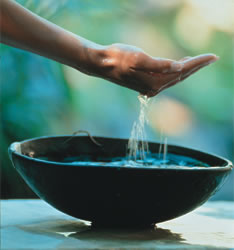Saving Water At Home
Saving water in the home

By thinking carefully about your water use in the home and changing some water-wasting habits, it is easy to save water.
- Vegetables and fruit should be washed in a bowl rather than under a running tap and the leftover water can be used for watering house plants.
- Use the minimum amount of water required when you boil water in saucepans and kettles; that way, you’ll save energy as well as water.
- Try keeping a bottle or jug of water in the fridge instead of running taps until the water runs cold.
- Half-load programmes on dishwashers and washing machines use more than half the water and energy of a full load. Therefore, wait until you have a full load before switching the machine on.
- Try not to leave the tap running while you brush your teeth, shave or wash your hands, as this can waste up to 5 litres of water per minute.
- A 5-minute shower uses about a third of the water of a bath. But remember that power showers can use more water than a bath in less than 5 minutes.
- Old toilet cisterns can use as much as 9 litres of clean water every flush. Reduce this by placing a save-a-flush or (hippo) in the cistern.
- Cotton wool and tissues should be put in a waste bin rather than flushed down the toilet.
- It is an amazing fact that a tap losing one drop a second will waste 15 litres a day. A dripping hot tap could cost you up to a quarter in fuel alone. Drips can also stain your bath or sink and the tap seating could be permanently damaged. Replace worn tap washers for a quick and cheap way of saving water.
- Burst water pipes can cause serious damage as well as waste water. Ensure your water pipes and external taps are lagged in time for the cold winter months.
- When cleaning the bathroom, turn the tap on only when you’re ready to rinse down. You’ll use less water by filling a bucket or washing up bowl instead of rinsing the cloth under running water.
- Fit insulation to hot and cold water pipes. A lot of water can be wasted by running taps whilst waiting for the water to get hot.
- Faulty ball or float valves in toilets and header tanks waste water – and they make an annoying hissing noise as well! If you hear that noise or see drips from your overflow pipe, you need to fix the ball valves.
- Do not attempt to feed the overflow pipe into a waste pipe, gutter or drain. It is illegal and could contaminate your water supply while preventing you from knowing when a serious leak is occurring.
